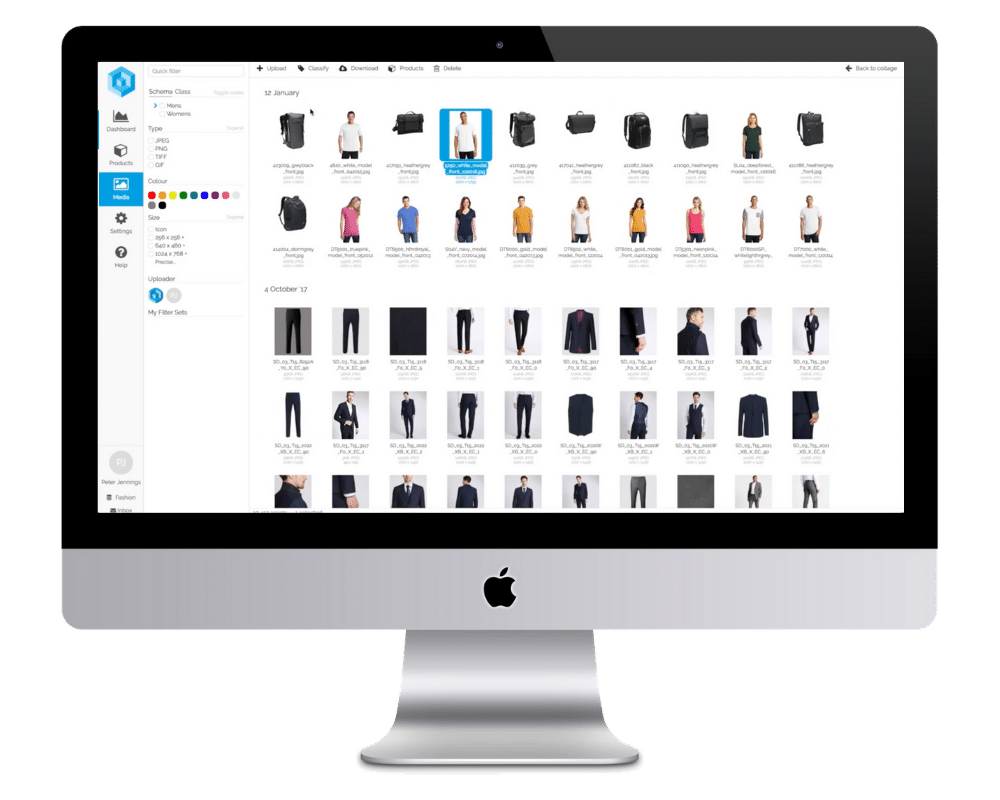Key Takeaways
- B2B eCommerce is the process of selling goods or services online from one business to another using digital platforms.

- Strong product information, real-time data, and automation are now essential for B2B eCommerce growth.
What Is B2B eCommerce?
B2B eCommerce refers to online transactions where one business purchases goods or services from another business. Unlike B2C retail, B2B buying usually involves:
- Large order volumes
- Contract-based pricing
- Purchasing workflows
- Multi-stakeholder approvals
- Complex product data
- Industry-specific regulations
A helpful definition from the U.S. Census Bureau describes eCommerce simply as “the sale of goods or services where the buyer places an order through an online system.” In B2B, those systems often include ERP-integrated webstores, procurement portals, EDI platforms, or marketplace storefronts.
Use Cases
B2B eCommerce spans countless industries. Common examples include:

-
Manufacturers: Selling spare parts, components, and made-to-order items directly to distributors or OEM partners.
-
Distributors: Providing customers with real-time stock availability, tiered pricing, and self-service account management.
-
Wholesalers: Offering bulk ordering, personalized catalogs, and automated reordering.
-
Construction suppliers: Enabling contractors to purchase materials online with accurate specifications and compliance data.
-
Retail brands: Selling to franchisees, partner stores, or multi-brand retailers with centralized digital catalogs.
These scenarios highlight why B2B eCommerce must support not just transactions, but also data governance, workflows, and highly detailed product information.
Why B2B eCommerce Matters for Modern Companies
Digitally mature B2B companies gain a major competitive edge. Research from McKinsey shows that over 65% of B2B buyers prefer digital and remote interactions, and many now expect the same frictionless experience they get from consumer shopping.
Below are some of the most important reasons B2B eCommerce matters today.
Challenge #1: Complex Buying Journeys Slow Down Sales
B2B buyers often rely on sales reps to find product information, confirm specifications, check inventory, and finalize pricing. This slows down the purchasing process and creates bottlenecks.
Solution via Digital Self-Service
A strong B2B eCommerce presence solves this by giving customers:
- Real-time product availability
- Accurate technical specs
- Self-service reordering
- Digital quotes and approvals
- Personalized pricing
Digitally mature businesses report faster order cycles, higher accuracy, and reduced support tickets. The easier it is to buy, the more customers spend.
How B2B eCommerce Improves Revenue, Efficiency, and Customer Experience
Key Feature #1: Centralized Digital Catalogs

Modern B2B buyers demand complete, detailed, and reliable product information. This includes:
- Technical specifications
- Certifications and compliance data
- Variants
- Material details
- Assembly instructions
- Rich digital assets such as images and PDFs
Without centralized product data, B2B eCommerce platforms struggle to deliver a strong customer experience.
Use Case Example
Consider a distributor selling HVAC parts. Customers need exact dimensions, compatible units, AHRI numbers, installation guides, and region-specific requirements. With a clean, structured product information workflow, the distributor can:
- Publish accurate data across multiple sales channels
- Reduce returns caused by incorrect specs
- Speed up purchasing decisions
- Provide contractors with quick, mobile-friendly access on-site
The result is higher trust, higher conversions, and fewer order errors.
B2B eCommerce and PIM: Why Product Information Matters
Successful B2B eCommerce depends heavily on accurate, complete, and context-rich product information. A Product Information Management (PIM) solution gives teams a central system to manage, enrich, and distribute product data everywhere it needs to go.
With a PIM, B2B businesses can:
- Standardize technical specs across thousands of SKUs
- Share consistent data with ERPs, eCommerce platforms, and marketplaces
- Maintain accurate documentation for compliance
- Automate updates across digital storefronts
- Publish products faster to generate revenue sooner
For companies with large, complex catalogs, PIM becomes the foundation of scalable B2B eCommerce.
B2B eCommerce Examples Across Industries

Below are real-world examples showing how B2B companies are using eCommerce to grow:
1. Industrial Manufacturers
Manufacturers increasingly sell replacement parts and configurable products online. Many offer portals that allow buyers to view custom pricing, check engineering documentation, and submit build-to-order requests.
2. Distributors and Wholesalers
Distributors use eCommerce to digitize account management, allowing customers to:
- View negotiated pricing
- Track orders
- Reorder from purchase history
- Download safety sheets
- Access real-time inventory
This reduces strain on customer service teams and improves satisfaction.
3. Construction and Building Products
Contractors and builders expect digital access to product specs, certifications, and installation documents. B2B eCommerce makes it easier to compare items, ensure compliance, and buy on the job site.
4. Apparel, Fashion, and Retail Supply
Retailers selling to franchisees or multi-brand partners often provide online portals with rich imagery, variant information, and marketing assets to streamline in-store merchandising.
FAQs
Q: How does B2B eCommerce differ from B2C?
A: B2B focuses on business buyers, high order volumes, personalized pricing, and workflow approvals. B2C focuses on consumer shopping and emotional purchase triggers. B2B platforms must support complex product data, contracts, and multi-stakeholder purchases.
Q: Do all B2B companies need an eCommerce platform?
A: Not all, but most benefit. Even companies that rely on field reps or long-standing customer relationships are adopting eCommerce to provide faster, more transparent buying. Many buyers now expect digital options before they contact sales.
Q: How do I know if my catalog is ready for B2B eCommerce?
A: If your product information lives across spreadsheets, PDFs, ERP systems, or rep inboxes, you’ll need to centralize it before launching. A PIM helps create the structure, standards, and enrichment needed for a high-performing storefront.
Conclusion: What This Means for B2B Leaders Looking to Scale Online
To summarize, B2B eCommerce is no longer optional. Buyers expect speed, accuracy, transparency, and digital convenience. Companies that invest in well-structured product information, self-service tools, and seamless digital workflows will win more deals—often before a customer even speaks to sales.
If your organization plans to launch or improve its B2B eCommerce channel, start with your product information foundation. Clean, centralized, accurate data fuels every digital buying experience.












